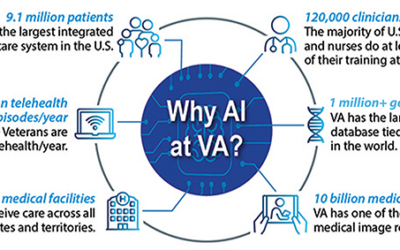For the past several years, VA has been identifying the most underserved facilities in its system and requiring them to create action plans to improve care to their veterans.
VA Telemedicine Rates Remain High After COVID-19 Pandemic, Especially for Mental Healthcare Visits
Following the COVID-19 pandemic, telemedicine rates for veterans enrolled in VA healthcare services remained high, accounting for more than half of mental healthcare visits, while telephone-based care has decreased to pre-pandemic levels, according to a recent study.
Psychoactive Drug Ibogaine Effectively Treats TBI Complications
The signature injury of U.S. veterans from recent military conflicts, traumatic brain injury (TBI) is a leading cause of injury-related disability.
Internal VA Investigation Verified Sexual Harassment Complaints Within ORMDI
An internal VA investigation has verified many, though not all, of the sexual harassment allegations made public by members of the House VA Committee in January.
Rare Congressional Subpoena for VA in Sexual Harassment Investigation
The House VA Committee has voted to subpoena VA Secretary Denis McDonough to release documents pursuant to an ongoing sexual harassment investigation involving several supervisors in VA’s Office of Resolution Management, Diversity, and Inclusion.
Opposing Trends for Accidental Death Rates in Returning Soldiers
A longitudinal cohort study, published in the Annals of Epidemiology, determined if risk for accidental death overall, or the most common types of accidental deaths, varied over time in relation to when a soldier returned from a combat deployment.
More Research Needed on High Melanoma Rates in AI/AN People
Non-Hispanic American Indian/ Alaskan Native (AI/AN) people have the second-highest rate of melanoma in the United States after non-Hispanic white people.
Cause of Kidney Injury After Procedures Not Always Contrast Media
The administration of iodinated contrast media is not responsible for all changes in creatinine levels in patients undergoing the procedures.
Black Veterans Get CKD Younger, Have Lower Death Rates
The younger age of chronic kidney disease (CKD) in Black patients can help explain some of the differences and disparities compared to white patients with CKD, according to a new study.
Much More Dual Testing for CKD Needed Within VHA
A new study that included VA researchers made the case for much more dual testing for chronic kidney disease (CKD) in high-risk patients to improve disease management and patient outcomes.
Processing of ICE Medical Claims by VA Sparks Controversy in Congress
Republican legislators butted heads with VA officials last month over the question of whether department resources were being spent on immigrants who have been placed in the custody of Immigration and Customs Enforcement (ICE).
Issues With Pharmacy Module in VA EHR Could Cause Medication Errors
Ongoing problems with the pharmacy module in VA’s new Oracle electronic health record (EHR) have the potential to lead to medication errors, increasing lawmakers’ concern about plans to expand the new system.
VA Has Low Rates of Preoperative Life-Sustaining Treatment Documentation
Surgery is a significant healthcare event that necessitates timely planning for goals of care (GOC), involving discussions about one’s current values, aspirations and treatment preferences.
Some Veterans With Dementia Might Have Treatable Cirrhosis Brain Effects
Could 1 in 10 veterans diagnosed with dementia actually have reversible cognitive decline caused by advanced liver disease?
Cold, Heat Waves Can Present Extra Danger for COPD Patients
Patients with chronic obstructive pulmonary disease (COPD) are adversely impacted by extreme weather conditions, and the effects vary by gender and ethnic backgrounds.
Legislators Told AI Both Promising, Scary for Improving VA Healthcare
The speed at which artificial intelligence (AI) is being embraced at the VA has legislators both hopeful and concerned, optimistic that it can improve veterans’ health but worried about data privacy and the possibility of software superseding human decision-making in clinical settings.
VA Study: Microbial Contamination Continues in Hospitals, Even When Recommended Cleaning Protocols Are Followed
Microbial contamination—including pathogenic and potentially pathogenic bacteria—persisted on high-touch hospital surfaces despite compliance with recommended disinfection protocols, according to a study performed at the Central Texas Veterans Healthcare System.
How Veterans With TBI, GWI Present With Frontotemporal Disorders
Frontotemporal lobe disorders (FTD), which affect personality, behavior and language, are among the most common brain neurodegenerative disorders.
Patient Selection for Lung Cancer Screening Is Less Than Optimal
Clinician judgment, not patient characteristics, often is the deciding factor in which VA patients are screened for lung cancer, according to a new study.
Even Mild COVID-19 Infections Caused Impaired Fitness in Military Personnel
Healthy, young members of the military who have had COVID-19 may experience impairments in fitness up to a year after their acute illness has resolved
White Patients Much More Likely to Receive Knee Arthroplasty In MHS
The U.S. Military Health System is touted as an equal-access medical provider, and scores of studies have demonstrated that few racial inequities exist in the treatment it provides for many conditions.
Despite Little Down Time, New Oracle-Cerner EHR Not Popular With Staff
According to VA, at least one aspect of its new Oracle-Cerner electronic health record (EHR) system is showing demonstrable improvement–a reduction in the number of times the system as a whole has been offline and inaccessible.
Homeless Veterans More Likely to Receive Risky Benzodiazepine Prescriptions
Despite an elevated risk of mental illness and substance use disorder in most homeless populations, a scarcity of research exists on the use of psychiatric medications and understanding of prescribing practices among providers for these populations.
Legislators Raise Concerns About Lack of Background Checks at VA
VA apparently lacks the personnel needed to complete timely background checks on all new staff, resulting in employees going to work at VA hospitals without ever being fully vetted, according to a legislator.
VA Healthcare, Fourth Mission Face Stresses From Continued Climate Change
With a worsening climate crisis, VA expects to be called upon more and more to implement its fourth mission—to act as a backstop for the nation’s overall healthcare network during times of emergency.
Telehealth Offers Promising Alternative to Traditional Sleep Medicine Care
Insufficient and disturbed sleep, as well as clinical sleep disorders such as obstructive sleep apnea, shift work disorder and nightmare disorder, are highly prevalent in the U.S. military and can result in increased accident risk and diminished military readiness.
Very Elderly Patients Fare Much Worse When Treated for DLBCL
Diffuse large B-cell lymphoma (DLBCL) becomes much more difficult to treat in older patients, according to a new study suggesting that more adults of advanced age be included in clinical trials for new agents.
Despite Disparities, Making a Difference for Veterans With Relapsed DLBCL
DURHAM, NC—Recent Food and Drug Administration approvals of chimeric antigen receptor (CAR) T cell therapies and novel immunotherapies have helped to significantly improve outcomes for patients with relapsed and refractory diffuse large B cell lymphoma (R/R DLBCL)....
More Diverse Dataset Raises Questions about MGUS Risk Models
Patients with monoclonal gammopathy of undetermined significance (MGUS) have been thought to have a less than 1% chance of progressing to multiple myeloma as long as their M-protein levels are below 1.5 g/dL.
For CLL, BTK Inhibitors Appear to Extend Time to Next Line Most
JACKSONVILLE, FL—As treatment options for chronic lymphocytic leukemia (CLL) multiply, physicians face an increasing array of sequencing options but have little guidance from clinical trials of the most effective order given each patient’s specific disease...





